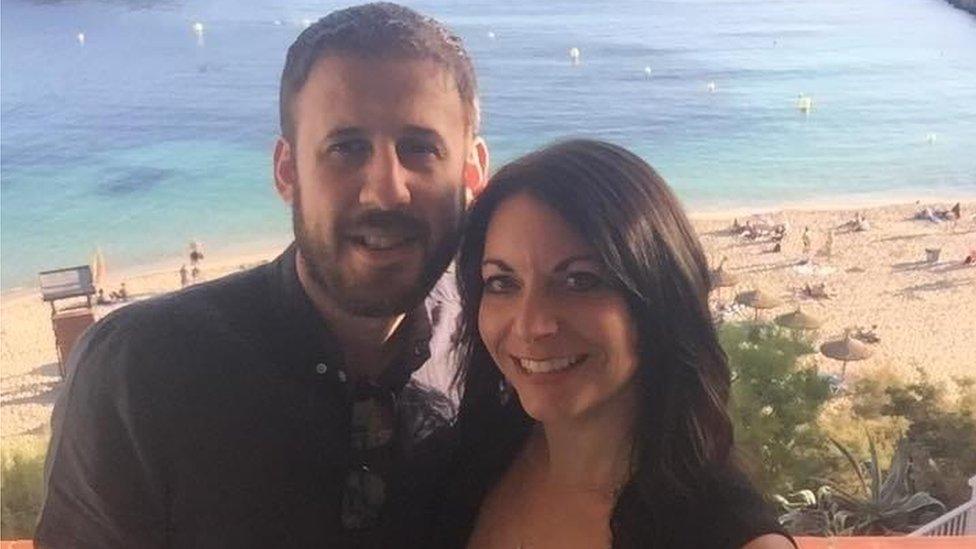Coronavirus: 'Big fat British Asian weddings' forced to slim down
- Published

Vishal Panesar and Ravika Sabh hope that by delaying their wedding they can invite more guests
"We've always pictured having the big fat Indian wedding," say Vishal Panesar and his fiancée Ravika Sabh, almost in unison.
Like thousands of couples, Londoners Vishal, 25, and Ravika, 24, had to postpone their wedding and reception after the coronavirus pandemic struck.
It was meant to be a lavish affair with three separate events and 400 guests.
But current measures imposed on weddings and gatherings mean the prospects of a big blowout are slim.
The UK wedding industry as a whole has been hit hard by the pandemic, with weddings banned under almost all circumstances since lockdown began.
That ban was lifted on 4 July in England, where small weddings with up to 30 guests are now allowed, with other restrictions. There are other rules for Scotland, Wales, and Northern Ireland.
Vishal and Ravika have cut down their guest list but are still keen to see whether a wedding with more than 30 guests is possible.

Vishal had arranged an elaborate outdoor proposal
"Restrictions are being eased up now, and people might say you can't have a wedding with 400 guests, but you can have 200. That plays a big part in moving and postponing [our wedding]."
So as well as moving their May 2020 wedding to October, they have also pencilled in a date in June 2021 at the same venue, in the hope that by one of those dates they can have 200 or more guests.
Big spenders
It is estimated the wedding industry in the UK is worth around £10bn, with average spending on a wedding about £27,000.
But British Asian weddings, traditionally larger family affairs, with multiple events, tend to cost more.
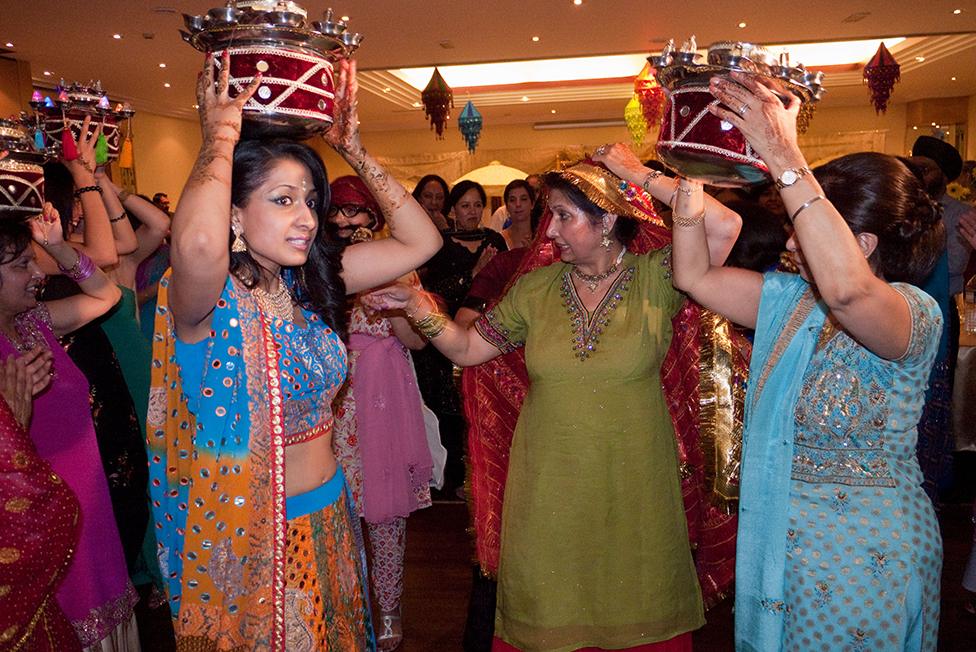
British Asian weddings are often lavish affairs
Anisha Vasani from Bridelux, a specialist brand for the luxury wedding industry, estimates that British Asian weddings could account for nearly half of the UK wedding industry.
"The average Asian couple spend between £50,000-£100,000 on their wedding, depending on how many functions they hold for their celebrations, with costs only expected to grow."
Many businesses specialising in supplying the Asian wedding market have suffered during the pandemic.
Seema Sarfraz runs Seema Sarees in east London. Her family business has been there since 1985 and bridal outfits are the mainstay of her sales.
Social media has been our 'saving grace'
"The time that we went into lockdown was one of our biggest periods for bridal orders. In a normal year we would take 400-500 bridal orders, we're talking about £500,000 worth of sales."
With her shop closed during lockdown and her staff furloughed, Seema had more time to focus on social media.
She already had a sizeable Instagram following, which had previously brought in sales, but like others, she discovered the power of TikTok and started uploading fashion shoots of models in bridal outfits to Bollywood and hip hop tracks.
It wasn't long before an unassuming bridal shoot went viral. "I woke up in the morning, and I'm like, 'Nine million views, 250,000 followers?' And from then on it's just built and built."
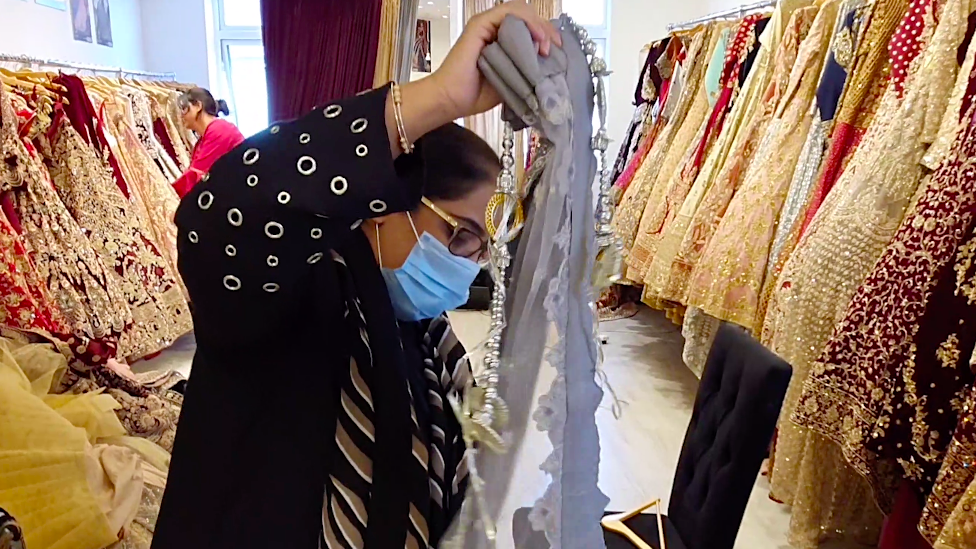
Seema Sarfraz says lockdown has hit bridal outfit orders
She now has more than a million followers on TikTok. It has resulted in some sales for Seema too, notably from the US and Canada, but she's keen to welcome customers back into her store, albeit while social distancing and wearing face coverings.
Suppliers hit
Other wedding businesses - those that help make events happen - have also had to stop and take stock of where their livelihoods will come from.
Deep Bajwa runs Opulence Events, a luxury wedding and event planning company. "Last year I had 37 weddings, and this year we managed to get one in before lockdown.
"We deal with larger numbers for the weddings we work on, so for us I can't see it happening [this year]."
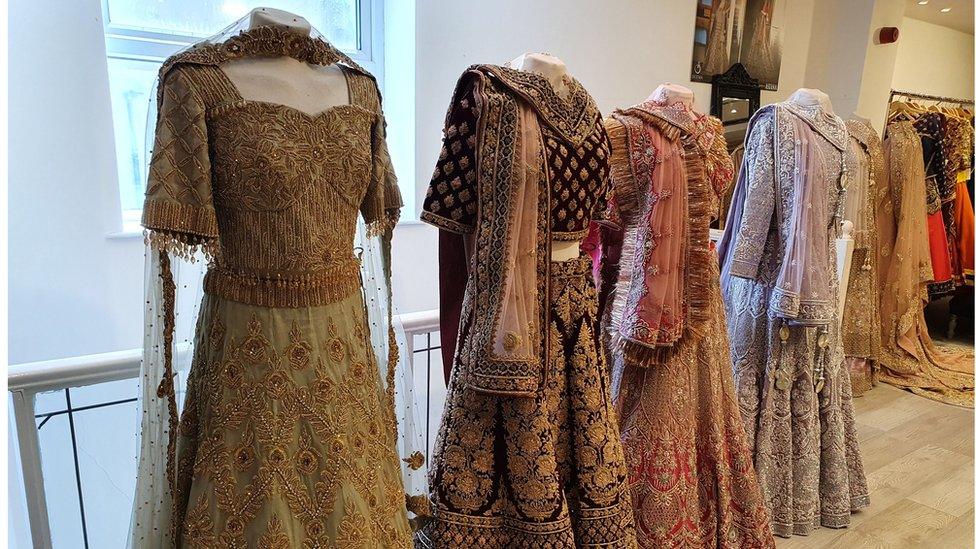
British Asians like to splash out on weddings, including on their outfits
Many of Deep's clients are couples and families who spend upwards of £100,000 on their weddings - that includes venues, catering, clothes, entertainment and jewellery.
"We like it big! We like to have an amazing show. It's big money that's spent on Asian weddings."
Deep says the lockdown has had huge implications for other suppliers she works with.
"We've had to postpone everyone's payments until next year. Most people's terms are two to four weeks for the final payment before the event, now if the event itself has moved, the final payments have gone with them."
'So much we don't know'
She, and others in the industry, are unsure of how Asian weddings of this scale will happen in future.
Deep mentions caterers having to rethink how they would serve buffets, and trying to figure out how to have a dance floor where you can socially distance yourself from others.
"There's still so much we don't know but we're keeping an eye on all the information, and trying to keep our clients happy and informed."
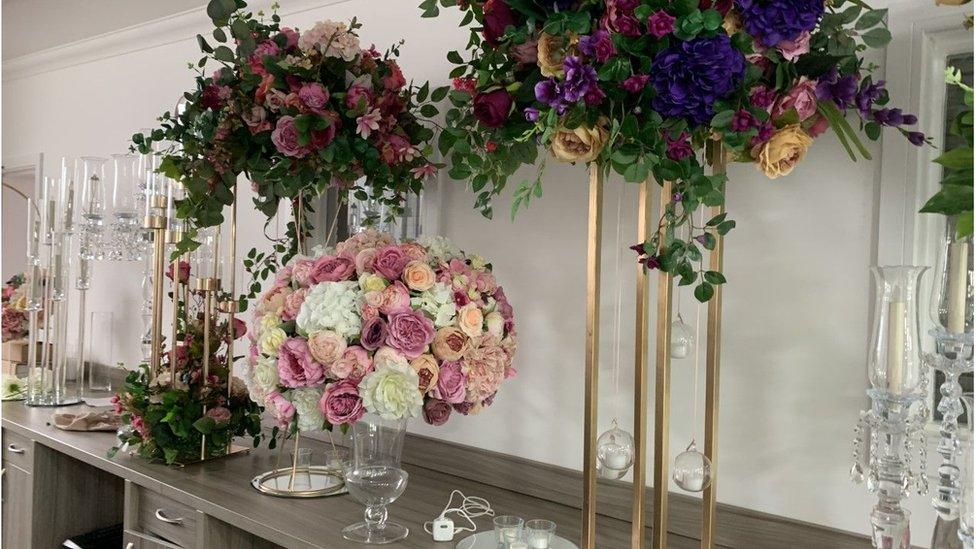
Event planning firm 1SWEvents doesn't have any weddings on its books until the end of the year
How will Asian wedding businesses deal with the likelihood of smaller, scaled back weddings in the immediate future?
Timmy Kader is the co-founder of 1SWEvents, an event planning and decorating company that counts boxer Amir Khan as one of its clients.
She and her team are used to decorating plush venues that can hold hundreds of guests. "We haven't got any weddings until the end of this year, which are still hanging on the edge because we don't know if there will be a second wave [of coronavirus]."
Nevertheless, she is hopeful for the future.
"People still want an Instagramable wedding and you can have that wedding in your home, providing you get a décor expert in to advise you and still make it look really pretty."
- Published14 July 2021

- Published30 June 2020
